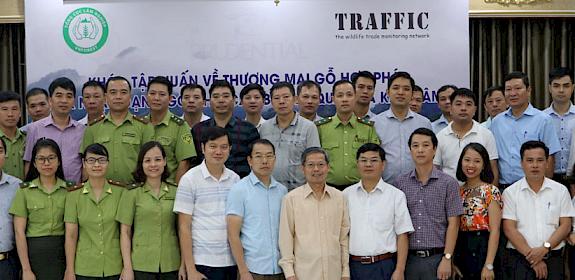DHL eCommerce in Thailand Boosts Efforts to Combat Illegal Wildlife Trade
Bangkok, Thailand, 26 July 2018—In order to help combat the shipping and transport of illegal wildlife products, TRAFFIC, through the the USAID-funded Wildlife Trafficking Response, Assessment and Priority Setting (Wildlife TRAPS) Project, delivered a capacity building workshop in Bangkok yesterday for staff at DHL eCommerce in Thailand to learn how they can play a key role in helping prevent the trafficking of wildlife.
The workshop covered the local and global implications of wildlife trafficking crimes, the role of the CITES convention in regulating the international wildlife trade, common wildlife trafficking trade routes, the modes and methods used by wildlife traffickers for shipping illegal products, and risks to the transport and logistics sector. During the workshop, participants discussed potential vulnerable points along their supply chains in Thailand and ways to strengthen their company’s operations, staff and customers’ awareness, and reporting mechanisms for wildlife trafficking.
Today’s workshop raised awareness of how wildlife is threatened around the world, gave us a clear understanding of the potential impacts from wildlife trafficking to our core business, and helped us understand what actions could be taken to strengthen our operations against the wildlife trafficking
Mr Wittaya Khoryiamklang, DHL Transport Manager
“Leadership from companies like DHL plays a very important role in tackling wildlife trafficking. Only through long term and positive collaborations between the private sector, government, and NGOs we can achieve tangible impacts to stop wildlife crime.” Said Mr Somkiat Soontornpitakkool, Director of the CITES management authority of Thailand, who attended the workshop.
Following the workshop, staff were awarded certificates of participation along with informational resources for further learning. In the coming months, TRAFFIC will continue to provide technical guidance to DHL in Thailand to support the implementation of those action points identified during the event.

“Wildlife trafficking is a transportation-intensive activity and workshops like this can catalyze positive action on the ground to help companies to stay free from unwittingly transporting illegal wildlife products. The Deutsche Post DHL Group is already a signatory of the United for Wildlife Transport Taskforce Buckingham Palace Declaration, so today’s event could be seen as a practical step in helping to implement those high level commitments” said TRAFFIC’s Monica Zavagli, Wildlife TRAPS Senior Project Officer.
Thailand ranks second in wildlife trafficking instances through the air transport sector globally, and in recent years has been on the front lines of many large-scale illegal wildlife seizures, intercepting shipments of rhino horn, ivory, rosewood, and pangolin scales, among other commonly traded wildlife products.
Many in the transportation sector are recognising the need to take action against wildlife trafficking. Recently, Etihad developed a new 20-minute online module designed to inform its employees of the business risks associated with the illegal wildlife trade and ways to prevent them. In addition, the USAID Reducing Opportunities for Unlawful Transport of Endangered Species (ROUTES) Partnership has conducted trainings across Africa, the Middle East, and Asia to train airport and airline employees in key wildlife trafficking hubs.
About Wildlife TRAPS
The Wildlife TRAPS Project, implemented by TRAFFIC and IUCN with funding support from USAID, is helping to forge cross-sectoral partnerships with government and experts in inter-governmental organisations, NGOs, academia, and the private sector to identify risk mitigation strategies to prevent future zoonotic spillover potential associated with trade in wild animals.
As well as social and behavioural change interventions, the Wildlife TRAPS project is supporting policy and regulatory reform efforts, including strengthening supply chain management systems. The identification of critical control points within wildlife trade supply chains will help target illicit and other high-risk wildlife trade practices that may facilitate the transmission of zoonotic diseases.
About USAID

The United States Agency for International Development (USAID) is responsible for the majority of overseas development assistance from the United States Government and works to end extreme poverty and promote resilient, democratic societies while advancing security and prosperity for America and the world





